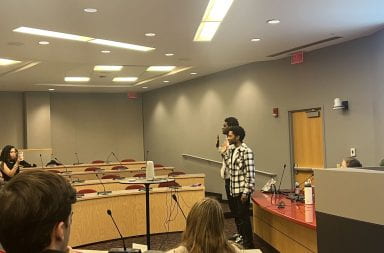Traveling in the campus area on the weekends could soon be more accessible for some students with the help of a new $20,000 Undergraduate Student Government funded pilot project.
Starting Friday, the East Residential route of the Campus Area Bus Service will extend its Friday night hours to 2 a.m., two hours later than the previous midnight cutoff. CABS will also add hours of operation Saturday night from 8 p.m. until 2 a.m., a day it didn’t previously run at all.
There will be one bus driving the route for the extended hours, with a 30-minute frequency. The East Residential route, which includes Summit Street and 4th Street east of High Street, as well as 17th and 19th avenues on campus, will not change during the extended hours.
The extended hours pilot program will last the entire semester, said USG President Taylor Stepp. He also said there will be a Student Safety Service representative from Ohio State Police on the bus during the extended hours as well.
The estimated cost to add the hours of operation will be about $800 per weekend, said Lindsay Komlanc, spokeswoman for Administration and Planning in an email. USG will pay up to $20,000 of the additional costs, which will go toward drivers, student safety representatives and other expenses such as fuel and bus maintenance.
Stepp said the two main points of the pilot program are to continue improving student safety and provide convenience to students traveling at night.
“To offer a service extension like this is not only big for students, but really great for the university’s peace of mind about our students traveling in the off-campus community,” Stepp said.
Niraj Antani, USG’s senior counselor, said student safety was an important factor for the additional hours.
“I think it’s huge when it comes to safety. The way to make kids safer is to keep them off the streets,” said Antani, who played an integral role in forming the program. “This way they can ride the bus instead and be dropped off a lot closer to home instead of trekking through off campus.”
The agreement to add hours was made over winter break, Stepp said, but the program has been in the works for several months.
“From Transportation and Traffic Management, when USG approached us with this initiative, we were definitely interested in being able to partner with them to try this pilot program to evaluate it,” Komlanc said.
Some students said they are supportive of the decision. Ryan Hopkins, a second-year in business, said he would use the extended service.
“Obviously there have been some accidents and stuff that have happened late at night, so I think it will help people to get where they need to go, and it’s a safer way of transportation,” Hopkins said.
Dani Rand, a third-year in animal science, said the change will make her feel safer when she’s on campus studying late.
“Those of us who study really late are going to be a lot happier that the bus runs late,” she said. “I utilize it every day, and the fact that it’s going to have longer hours benefits me more.”
However, others said it could lead to problems.
“It sounds like it could be a bit more of a complication than an aid. A lot of people are just going to get, to be honest, really really drunk here on campus and ride the bus back,” said Regan Hitt, a second-year in molecular genetics. “I feel like a lot of fights are going to break out and it’s going to cause more problems than good.”
Bryan Wesney, a full-time CABS driver, said he doesn’t have any problems with the change and hopes it will lead to improvements down the road.
Although the extended hours are only a test run this semester, Stepp said he thinks they will be here to stay.
“I believe that this will be very successful,” he said. “I think that we have a high frequency of students in the off-campus area at late hours, and I think they will certainly take advantage of it.”


